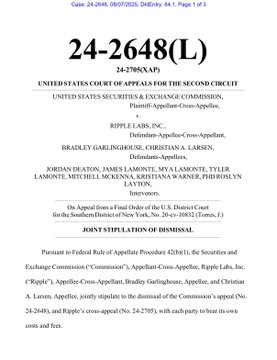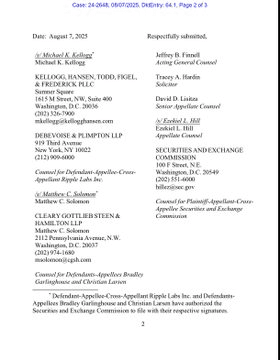Both Ripple and the SEC have abandoned their appeals, indicating that continuing to hear this case is ineffective given the inconsistent ruling outcomes and the SEC's relaxation of its cryptocurrency enforcement stance.
Ripple Labs' nearly four-year legal dispute with the U.S. Securities and Exchange Commission (SEC) has officially ended, becoming one of the most high-profile cases in cryptocurrency history. This move drove the XRP price up over 13% after the announcement.
On Thursday, both parties submitted a joint notice to the U.S. Court of Appeals for the Second Circuit, stating that they would voluntarily withdraw their respective appeals.
The U.S. Securities and Exchange Commission (SEC) withdrew its challenge to a 2023 ruling that determined Ripple's XRP token does not constitute securities when sold on a public exchange. Ripple then withdrew its appeal. Both parties agreed to bear their own legal fees.
The Ripple lawsuit has triggered a significant test of U.S. courts' views on digital tokens.
The case began in 2020 when the SEC sued Ripple, led by then-chairman Jay Clayton, accusing the company of raising funds through an unregistered securities offering by selling XRP. The lawsuit filed in the Southern District of New York quickly became a test case for how U.S. law should treat digital tokens.


In July 2023, U.S. District Judge Analisa Torres issued a split ruling, determining that Ripple's direct sale of XRP to institutional investors indeed violated securities laws.
However, she stated that selling to retail investors through public exchanges does not meet the definition of a securities offering, a conclusion widely viewed as a partial victory for the cryptocurrency industry.
The U.S. Securities and Exchange Commission appealed the retail portion of last year's ruling, while Ripple filed a cross-appeal seeking to fully defend its position.
SEC reduces aggressive cryptocurrency legal strategy, Ripple safely closes
However, after Donald Trump returned to the White House and appointed new leadership, the SEC began to abandon several enforcement actions. Since then, more than a dozen cryptocurrency-related cases and investigations have been dropped.
In June last year, Ripple and the U.S. Securities and Exchange Commission (SEC) agreed to resolve the remaining fines related to the case. Judge Torres imposed a $125 million fine on Ripple and issued a permanent injunction prohibiting Ripple from violating securities laws in future institutional sales of XRP. The fine is currently held in trust and will be transferred to the U.S. Treasury after the appeals conclude.
Earlier this year, negotiations to lower the fine amount failed, and Judge Torres rejected multiple proposals regarding procedural issues. The appeal was dismissed, finalizing the settlement terms and bringing an end to this protracted dispute.
Today, given that the ruling from 2023 remains in effect, legal observers suggest that this case may become a key reference point for courts assessing whether crypto assets qualify as securities. For Ripple, this paves the way for business expansion, especially in jurisdictions that have already adopted clearer regulatory guidelines.
